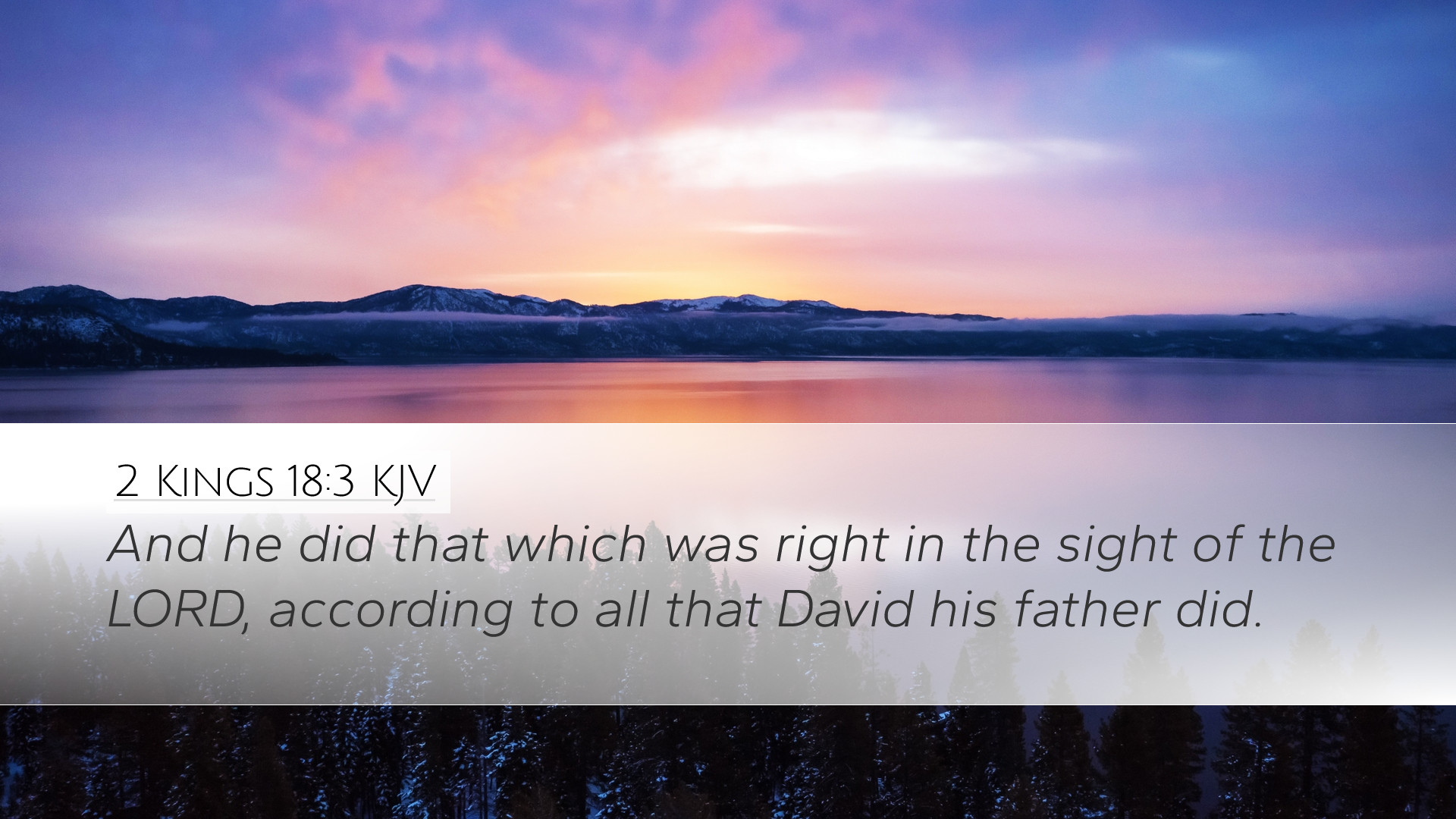Commentary on 2 Kings 18:3
Bible Verse: "And he did that which was right in the sight of the LORD, according to all that David his father did."
Introduction
The passage in 2 Kings 18:3 serves as a profound evaluation of King Hezekiah's reign in Judah. It establishes a benchmark for righteousness and faithfulness to God, reflecting upon the legacy of King David. This commentary draws insights from various public domain sources, providing a layered understanding of the verse's significance.
Contextual Background
Hezekiah ascended to the throne during a tumultuous period characterized by national decay and spiritual apostasy. His reign is contrasted against preceding monarchs, many of whom led the nation into idolatry and moral decline. Understanding Hezekiah’s leadership provides essential context for his actions and their impact on Judah.
Historical Significance
- King Hezekiah's Reform: Hezekiah is noted for initiating significant religious reforms, reinstating the worship of Yahweh, and eliminating idol worship (2 Kings 18:4). His commitment is likened to David’s, who is often seen as the epitome of a righteous ruler.
- The Role of David: Referring to David enhances Hezekiah’s authority and spiritual legitimacy, as David was a model of covenant faithfulness. The phrase "according to all that David his father did" underscores Hezekiah’s alignment with this ideal.
Theological Implications
This verse carries significant theological weight, examining the nature of righteousness in the sight of God. Matthew Henry highlights that doing what is right in God’s sight takes precedence over popular opinion or political expediency.
Rightdoing as Divine Expectation
- God’s Standards: Righteousness is not a subjective concept but is defined by God’s will as revealed in Scripture. In fulfilling this standard, Hezekiah's life becomes a template for current and future leaders seeking divine approval.
- Faithfulness Amidst Adversity: Hezekiah’s reign is marked by external threats, particularly from Assyria. His commitment to righteousness, even under pressure, highlights the characteristics of a true leader of God’s people.
Comparative Analysis with Other Kings
Throughout 2 Kings, the evaluation of kings is presented in a formulaic manner, often highlighting their fidelity or infidelity towards God. This creates a stark contrast between righteous kings like Hezekiah and his predecessors.
Lessons from Reigns
- Judah’s Spiritual Decline: The contrast between Hezekiah and previous kings, such as Ahaz, serves as a reminder of the dangers of turning away from God. Ahaz is criticized for leading the nation deeper into idolatry, which resulted in divine judgment.
- Righteous Leadership: Hezekiah’s actions demonstrate what it means to be a leader who seeks to fulfill God’s commands. His reign is a call to contemporary leaders to adhere to divine principles regardless of societal pressures.
Practical Applications for Today
The themes presented in this verse and Hezekiah’s reign offer practical lessons for modern believers, particularly those in leadership roles.
Emulating Righteousness
- Personal Integrity: Individuals are encouraged to pursue righteousness as a personal commitment to God, reflecting Hezekiah’s choice to align with divine standards.
- Community Influence: Pastors and leaders can draw from Hezekiah’s example to influence their communities positively. Righteous behavior can inspire broader social and spiritual reforms.
Resilience in Faith
- Facing Challenges: Leaders often encounter challenges that test their faith. Hezekiah’s example illustrates the importance of steadfastness and reliance on God amidst external pressures.
- Importance of Prayer: Hezekiah’s reign was characterized by prayerful dependence on God, particularly during times of crisis—as seen in his response to Sennacherib's threat (2 Kings 19). This highlights the need for prayer in seeking guidance and strength.
Conclusion
2 Kings 18:3 encapsulates a pivotal moment in Israel’s history, emphasizing the significance of righteousness in the eyes of God. The commentary draws on the legacy of both Hezekiah and David, inviting contemporary believers and leaders to foster integrity, faithfulness, and dependence on God’s guidance. As a model for righteous leadership, Hezekiah encourages all to seek the welfare of their communities by adhering to divine principles in their lives and ministries.


